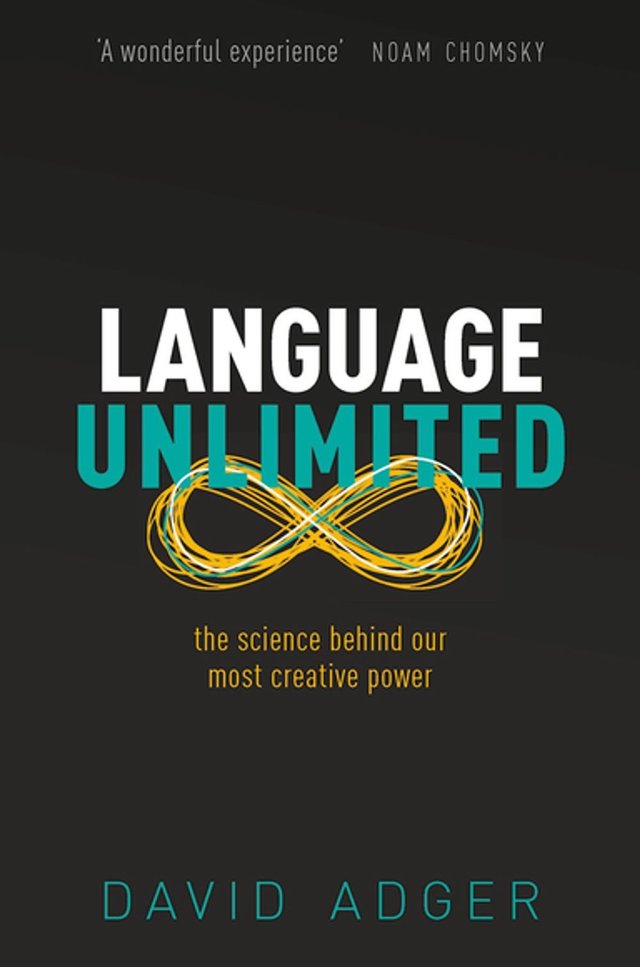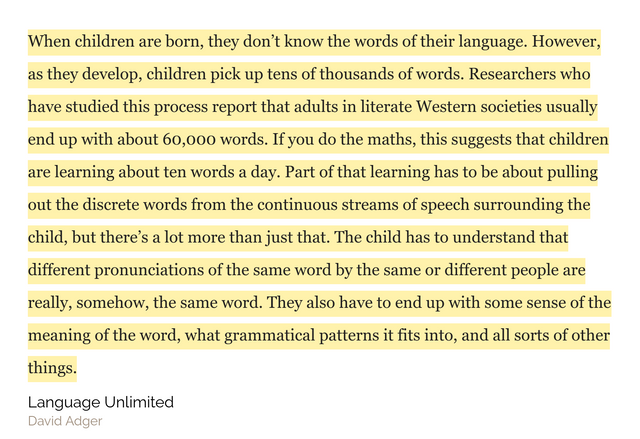
I want to begin this book by asking you to make up a sentence. It should be more than a few words long. Make one up that, say, spans at least one line on the page. Now go to your favourite search engine and put in the sentence you’ve made up, in inverted commas, so that the search engine looks for an exact match. Now hit return.
Question: does your sentence exist anywhere else on the internet? I’ve tried this many times and each time, the answer is no. I’m guessing that that was your experience too. This isn’t just a side effect of using the internet either. The British National Corpus is an online collection of texts, some from newspapers, some that have been transcribed from real conversations between people speaking English. There are over 100 million words in this collection.
I took the following sentence from the corpus at random, and searched for it again, to see if it appeared elsewhere in the millions of sentences in the corpus. I then did the same on Google. It’s amazing how many people leave out one or more of those essential details. There are no other examples. It seems crazy, but sentences almost never reoccur.
Think about your sense of familiarity with the sentences you hear or say. None of the sentences I’ve written so far feel new or strange. You aren’t surprised when you read them. You just accept them and get on with it. This is, if you think about it, quite remarkable. These sentences are new to you, in fact perhaps new to the human race. But they don’t seem new.
The fact that sentences hardly reoccur shows us that we use our language in an incredibly rich, flexible, and creative way, while barely noticing that we are doing this. Virtually every sentence we utter is novel. New to ourselves, and, quite often, new to humanity. We come up with phrases and sentences as we need to, and we make them express what we need to express. We do this with incredible ease. We don’t think about it, we just do it. We create language throughout our lives, and respond creatively to the language of others.
This book is a wave of universal grammar that gently hits and envelopes you. What Noam Chomsky started, David Adger is our caretaker for throughout this book, where he clearly explains, details and answers many questions, while graciously treating the reader as an intelligent being; this is not a book where its author has been paid by the word.
- Do we have conscious access to how linguistic structure works?
- Does sound have meaning in words?
- Is there any difference between how hearing or deaf babies acquire language?
- How do you go about making up a language?
Universal Grammar is also involved in categorizing aspects of our experiences as linguistic. In 2014, researchers in Yale and New York reported that they had played sounds to very young babies (one to four months old) and measured their brain responses using an MRI scanner.8 The researchers played speech sounds, as well as non-speech sounds like laughter or coughs, to these babies, and the scans showed that the babies processed these different kinds of sounds in different parts of their brains—essentially, towards the left-hand side of the brain—already within the first month of their lives.
As the children develop, parts of the brain become more and more specialized to human speech. But since all the children had this same bias towards the left-hand side of their brains, this strongly suggests that there is something inbuilt going on. Aspects of the babies’ brains are keyed to interpret some experiences as linguistic incredibly early on.
One of Adger's special abilities is to use examples in a clear and pedagogical way. For example:
For example, imagine I have a party, and everyone puts their coats in the upstairs bedroom. You’re tired, and want to leave, so we both go to that room to get your coat. Without finding it, I can still say: It’s here. It’s somewhere in this room. But it’s really weird to say: Here it is. It’s somewhere in this room.
To say Here it is you need to have just discovered it. You mark, using this special word order, that you’ve gone from not knowing where the coat is, to knowing where it is. This is the hallmark of Mirativity as we see it elsewhere. The speaker goes from not knowing what is being talked about, to suddenly knowing it.
More on Chomsky's universal grammar theory:
Also in the late 1950s, Noam Chomsky had begun to make arguments that human linguistic abilities are not part of our general learning skills but rather are a result of specialized innate capacity, a hugely controversial idea at the time. The ability of even very young babies to process continuous sounds as discrete units seemed to be evidence that Chomsky’s idea was true not just of syntax, but also of something as basic as perceiving sounds.
This idea took hold in the field of speech perception in the early 1970s. More and more experiments showed that babies imposed the same kinds of distinctions on the speech sounds they were exposed to, irrespective of the language of their community. Since speech is such a human phenomenon, scientists initially assumed that these experiments on babies’ categorical perception showed a specifically human capacity.

Adger moves away from infants and children into the areas of artificial intelligence, 'bots' such as Alexa and Google Assistant, and into the territory of creating new languages and what is required to successfully achieve that.
For example, the linguist Francis Nolan, who made up the snake language, Parseltongue, for the Harry Potter films, wanted something that sounded alien, far from human language, and very snakey. To do that, he restricted the range of sounds, allowing only those that don’t need you to vibrate your vocal cords in your throat—presumably lacking in snakes!
When you make particular sounds, or if you whisper, your vocal cords switch off. Only using sounds where your vocal cords are turned off creates a sibilant, whispery feeling. To get a sense of the difference, put two fingers on your throat, at the front, right in the middle then read out a sentence from this paragraph. Now whisper it. You should feel a difference in the vibrations in your throat. That’s your vocal cords switching on and off.
You can see this even more clearly by focussing on a particular pair of sounds. Make a long ssss sound then turn it into a zzz sound, with your fingers on your throat. You should feel the vibrations turning on and off, and you can switch back and forward, sssssszzzzzzsssssszzzzzz.
There's also swearing, beautifully exemplified by the use of Absolutely Fabulous:
We use swear words like damn, bastard, and fucking to express an attitude to the whole of what we say. We can interpolate these words in a sequence throughout the sentence. In fact, we can even interrupt single words with them. My favourite example is from the TV show Absolutely Fabulous, where the main character, Edina, is complaining that her daughter, Saffy, is going to leave home to go to university:
Edina: Where is it you’re going?
Saffy: Aberdeen.
Edina: Aberdeen.
Edina: Aber-bloody-deen.
Edina: I don’t know anybody in Aber-bloody-deen, darling!
David Adger has constructed a nifty book that teaches how universal grammar flows throughout us and has carefully used many examples to achieve his goal; we are Watson to his Sherlock Holmes as he deep-dives into understanding how language—for both humans and animals—is made, living, and understood.
Posted from my blog with SteemPress : https://niklasblog.com/?p=24210
Congratulations @pivic! You have completed the following achievement on the Steem blockchain and have been rewarded with new badge(s) :
You can view your badges on your Steem Board and compare to others on the Steem Ranking
If you no longer want to receive notifications, reply to this comment with the word
STOPTo support your work, I also upvoted your post!
Do not miss the last post from @steemitboard:
Vote for @Steemitboard as a witness to get one more award and increased upvotes!
Downvoting a post can decrease pending rewards and make it less visible. Common reasons:
Submit